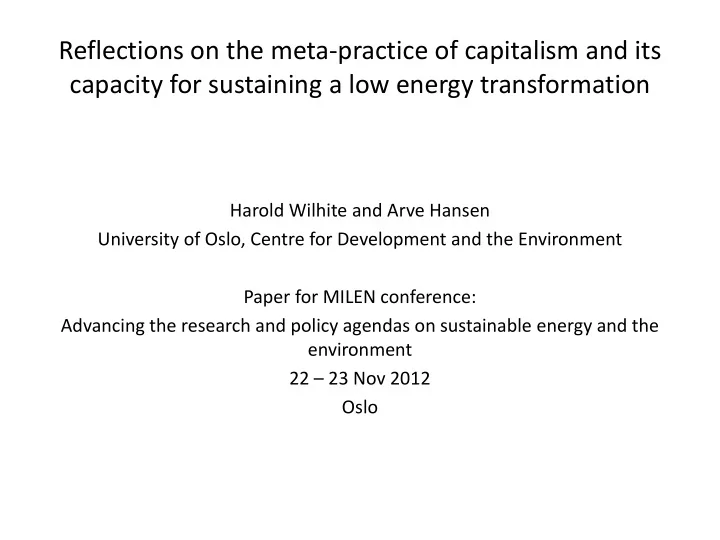

Reflections on the meta-practice of capitalism and its capacity for sustaining a low energy transformation Harold Wilhite and Arve Hansen University of Oslo, Centre for Development and the Environment Paper for MILEN conference: Advancing the research and policy agendas on sustainable energy and the environment 22 – 23 Nov 2012 Oslo
Problematic practices • An association in capitalism of ‘more’ with ‘better’ in many types and levels of policies and practices relevant to energy use • An overestimation of the power of markets to foster rapid reductions in energy use and environmental degradation • The efficiency delusion: A persistence in counting on efficiency (alone) to reduce energy consumption
US EIA Outlook 2011
An association in capitalist models of ‘more’ with ‘better’ in many types and levels of policies and practices relevant to energy use • The growth imperative: Without growth, any perceivable variety of capitalism stagnates or recesses. The consequence is that companies lose profits, workers lose wages and/or jobs, and politicians lose elections. • Eco-socialist Smith (2010: 29 and 33) writes that ‘ growth is an iron law of capitalist development, that capitalism cannot exist without constant revolutionizing of productive forces, without constantly expanding markets, without ever- growing consumption of resources …For more than 30 years, Herman Daly has chanted his mantra of ‘development without growth’ but he has yet to explain, in any concrete way, how an actual capitalist economy comprised of capitalists, investors, employees and consumers could carry on from day to day in ‘stasis’.
The embedding of growth in practices Richard Robbins: ‘The culture of capitalism is devoted to encouraging the production and sale of commodities. For capitalists, the culture encourages the accumulation of profit; for laborers, it encourages the accumulation of wages; for consumes it encourages the accumulation of goods. In other words, capitalism defines sets of people who, behaving according to a set of learned rules, act as they must act .’
An overestimation of the power of markets • In ‘fundamentalist’, neo -liberal versions of capitalism, market principles, including perfect competition, profit, maximization of self interest and expansion are ‘fundamental’ to capitalist development • Anthropologist Karl Polanyi: The result of the increasing control of the economic system by the market is that society is run as an adjunct to the market; “Instead of economy being embedded in social relations, social relations are embedded in the economic system ”.
Is the greening of markets the solution? • The idea behind green economy (Eckersley 1992 and 2011; Spargaaren and Mol 1992) is that it is possible to transform markets in such a way as to internalize the environmental costs of production, successfully commodify environmental products and thereby provide opportunities for green growth • This brings us back to the paradox and problems of the growth imperative
The efficiency delusion Efficient technologies are silver bullets. But bullets rebound. In a capitalist growth economy, money saved as a result of reducing direct energy costs of energy-using technologies and equipment will often be invested by the consumer in other energy using products or practices, the net result of which will likely be an increase in overall energy use. This is no longer a hypothetical contention but has been confirmed in numerous empirical studies
Confusing efficiency with reduction
Average per capita living space, Norway Data source: SSB 140 120 100 80 M2 M2 per person 60 40 20 0 1960 1970 1990 2000
The need for a radical re-framing • Critical thinking in all quarters of energy research on the capacity of growth, markets, profit and shareholder ownership to foster a sustainable transformation. • Research on the potential transformative power of things like: policy mechanisms oriented to reduce volume (homes, appliances, cars); encourage collective ownership (services, capital, land, equipment); support for product durability and the reuse of materials; support for communities of sustainable practice.
Recommend
More recommend